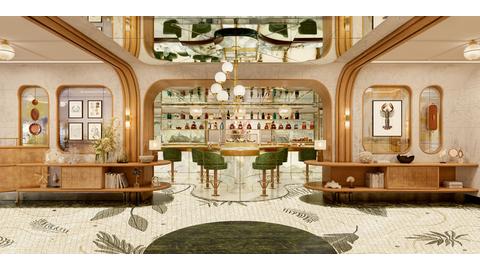Companies news
HongKongEcho: Decathlon Hong Kong’s Co-CEO on bucking the trends of these turbulent times

Crisis? What crisis? There’s no finish line in site for Decathlon according to the woman leading its Hong Kong expansion.
Lisa Noraz has never been one for fancy offices. The softly spoken Co-CEO of Decathlon Hong Kong is huddled over a laptop in the cosy back office of the sports retailer’s Central store.
“Coffee?” she inquires. It’s about an hour before the shop opens to the public for the day and small groups of employees in their branded white bibs are busy unpacking the remaining boxes of stock that arrived in the early morning. She leads us into another backroom where a handful of staff mill around a humble coffee machine. Noraz removes a used capsule and goes to throw the aluminium shell into the rubbish before she catches herself, looking instead for the recycling bin.
The 39-year-old has been with the French sporting goods powerhouse for the past four years, initially joining its nascent Hong Kong operations as a digital transformation leader. Her Co-CEO Hugo Jehlen, meanwhile, has been with the company his entire nearly-20-year career. “He’s got 100% Decathlon DNA,” she says with a laugh. “We’re very complementary in the way we work – we act as good sparring partners for each other.”

A MARATHON, NOT A SPRINT
The duo only took up their shared mantle six months ago, during a global pandemic that has pushed many retailers to the brink. Decathlon, however, seems to be thriving.
The accessible sports store launched in Hong Kong in 2017 and has opened three new locations since 2020, bringing its total footprint to seven stores across the city.
“Hong Kongers are very savvy consumers and they’ve welcomed us with open arms,” she says.
Another store opened in Tuen Mun in July.
“Our fully integrated business model is not really a secret anymore,” she says when explaining their remarkable resilience. “When you cut out all the middlemen by designing your own products, working closely with manufacturers, and distributing products yourself, you’re able to keep prices low.”
That explains some of the success, but not all. In the months leading up to the outbreak of COVID-19, Decathlon began using a new third-party distribution warehouse in Hong Kong as part of the brand’s gearing up towards a more robust online offering. “We already had a very digital-focused project here which we had invested in over the past three years,” she says.
Exercise also took on new meaning as many in the city adapted to working from home. “We have seen people become increasingly conscious of both their mental and physical health,” she notes. “In that sense we’ve been lucky to be able to accompany our users through this unique period.”
Noraz believes the focus on health will continue, but she is wary to draw too many concrete conclusions from patterns in online and offline purchases over the past year.
But the team will continue to experiment. “Hong Kong’s geography is very unique. For its population, if we were in Europe, we would have around 40 stores. Clearly, we can’t do that here,” she says. Its 1,500 square foot Click-and-Collect store in Ma On Shan – tiny by Decathlon’s standards – is the latest stab at a swift service for online purchases that can be collected in person. It’s one of the locations where orders placed before 1pm can be picked up that same afternoon after 6pm, while it rotates and showcases a selection of in-store products to be browsed while you wait.
In March 2021 it rolled out another new feature, announcing a swathe of new pick-up locations, including certain 7-Elevens and Circle K’s, to offer over 700 collection touchpoints across the city. A flexible returns policy – far from a given in the local market – is another of the brand’s selling points, she adds.
“We have to find the right balance,” Noraz says, underlining that Decathlon traditionally places great value on the experience its stores have to offer. Its mammoth Tseung Kwan O store, which includes over 72,000 square feet of indoor and outdoor shop space, is about the closest thing Hong Kong has to one of the brand’s European stores. A spacious terrace even offers a chance for customers to try out bikes or rollerblades before buying. “I think we will always need places where our users can really touch and feel products.”
The sheer pace of Decathlon’s expansion in the territory has caught some by surprise. But the keen sailing enthusiast says it’s down to the group’s insistence on an entrepreneurial approach to operations. “Each city or country is already very autonomous. But even within our team, there is a large amount of autonomy.”
That approach, which wouldn’t be out of place from a startup entering a new market, comes with its own hurdles. “Teammates are totally autonomous to make the best decision and measure it – people are not always used to that amount of freedom where there is no boundary of responsibilities within their role or area.”
Nonetheless, Noraz sees the benefits in allowing creativity to thrive. “Teammates own their projects and we support them, which is an exciting challenge for us as leaders.”











